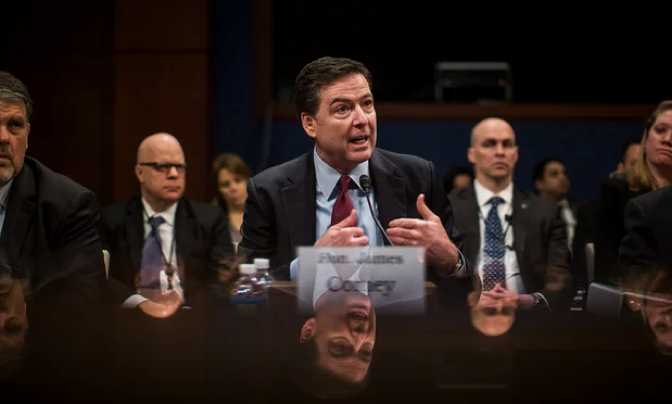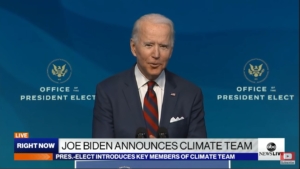Encryption, Elections, and Revolutions
Here’s What You Need to Know
The debate over privacy policies and encryption of tech devices has received banner headlines due to the U.S. Department of Justice seeking access to the San Bernardino shooter’s iPhone from Apple.
But the issue of privacy and encryption goes deeper than just this one battle and important legal precedents will be set before all is said and done.
- How Encryption Went Dark: Historically encryption technology was legally classified as a “munition,” treated by the government as a military grade weapon. With the rise of the tech industry in the 1990’s, the government deregulated encryption technology to accommodate new consumer electronics. Since government regulators relinquished control, however, law enforcement officials have argued the world of crime has “gone dark.”
- No Room For “Privacy Absolutism”: New York venture capitalist Fred Wilsonwarns against the tech industry’s “privacy absolutism” posture: “I do not think that because we now have the technology to lock things down (strong encryption) and because the industry that develops and maintains all of this technology has a strong libertarian bent that we should just abandon the framework that has worked in our society for hundreds of years.”
- Finding The Middle Ground: FBI Director James Comey has called on government investigators and tech companies to “find a middle ground that allows for strong encryption but accommodates law enforcement efforts.” This attitude has led the government to adopt a hesitant posture when addressing encryption issues like the WhatsApp case, but as federal investigators continue to bump into corporate encryption, these cases will have to come to some resolution.
- What’s The Obama Doctrine? While The New York Times reported on divisions within the Obama administration on this issue, President Obama made it clear at the SXSW Interactive conference last week that these changes would either be made in a responsible manner now or in a rushed, imperfect manner in the wake of another tragedy.
The debate and legal challenges regarding encryption is far from over, but where the courts land on this issue is undoubtedly going to be a key bellwether for what many describe as one of the fundamental legal questions of our era.
Subscribe to Receive Insights
"*" indicates required fields
RULE 40 UPDATE:
As we discussed in a previous TL;DR and Medium post the RNC’s Rule 40 (as currently written) requires any candidate to be considered for nomination by the Republican Convention to have received the majority of delegates from no fewer than eight states in order to be placed into consideration. So, after the latest round of contests here’s where the candidates stand:
- Donald Trump: Majority of 9 delegations (South Carolina, Alabama, Georgia, Massachusetts, Tennessee, Hawaii, Mississippi, Florida, Northern Mariana Islands)
- Ted Cruz: Majority of 4 delegations (Texas, Kansas, Maine, Idaho)
- John Kasich: Majority of 1 delegation (Ohio)
Since many of the remaining contests are winner-take-all, it will get more difficult for Cruz and Kasich to meet the current Rule 40 threshold. It will also be more difficult to keep accruing delegates without winning a state. That will leave candidates not named Trump to either hope for (or push for) a rules change or pray that Trump is unable to win a majority on the first ballot, giving many delegates the opportunity to vote for a different candidate.
News You Can Use
DEMS’ SCOTUS “FAIRY TALE”
Many Democrats claim the Senate has a Constitutional obligation to take up consideration of President Obama’s nominee to replace Supreme Court Justice Antonin Scalia. Despite relatively limited precedence to analyze, The Washington Postdetermined, “the Senate majority can in effect do what it wants – unless it becomes politically uncomfortable. Democrats who suggest otherwise are simply telling supporters a politically convenient fairy tale.” Senate Democrats can hold the opinion that Republicans are wrong not to take up the President’s nominee, but they cannot claim the majority is failing to honor their Constitutional duties.
FREE TRADE’S NEW NORMAL
For the first time in decades, opposition to free trade appears to be the leading sentiment among America’s political leaders. While left-of-center Democrats have long blamed free trade agreements for job losses, strong fears regarding open trade among Republicans are relatively new. This shift in public opinion poses a new challenge for business and free trade groups as they seek support for the Trans-Pacific Partnership and other trade deals.
REGULATING A REVOLUTION
U.S. House Majority Leader Kevin McCarthy recently announced an Innovation Initiative to remove government-made obstacles to innovation and bring government itself into the 21st Century. Such reforms are crucial to supporting “the sharing economy … that economist Klaus Schwab is calling it The Fourth Industrial Revolution.” At the same time, ordinances like one in Seattle would allow drivers for the popular ride sharing service, Uber, to unionize as independent contractors, potentially “creating anti-competitive effects for other drivers and less convenience for riders.”
BREMAIN TO BE FREE?
Writing for The Telegraph on President Obama’s plan to address the U.K. public directly to urge them remain in the European Union, London’s mayor Boris Johnsonremarks, “There is no country in the world that defends its own sovereignty with such hysterical vigilance as the United States of America. This is a nation born from its glorious refusal to accept overseas control. … So why is it essential for Britain to comply with a system that the Americans would themselves reject out of hand?”
MERKEL GETS TRUMP’D
In the first election since her decision to open the country to refugees last fall, Chancellor Merkel’s Christian Democrats (CDU) had their worst ever results, while the Alternative for Germany (AfD), an anti-immigrant party, saw record support. “The main source of the AfD’s support was from voters who hadn’t cast a ballot in the last election,” Politico’s Matthew Karnitschnig notes. “It also poached hundreds of thousands of voters from the established parties, in particular, Merkel’s CDU.” As a result, Karnitschnig predicts, “Merkel will face renewed calls from within her party to get tough [on refugees].”
LIKEABLE ENOUGH TO WIN?
Art Markman of Fast Company asks, “Do you need to be likable in order to be an effective leader?” Assessing the presidential candidates, Markman argues likeability combines agreeableness – how much you want others to like you – and sincerity – how much people believe their interaction with you is authentic. Sanders is viewed as more sincere than Clinton, who often comes across as agreeable but insincere. Trump and Cruz too are interpreted as sincere but too often disagreeable. In this election, argues Markman, “Being seen as sincere ups your chances that others will follow your vision. But leaders viewed as agreeable yet insincere run the risk that followers will question their vision …”
BITCOIN FOR CENTRAL BANKS
Computer scientists working with the Bank of England have devised a new proto-currency, called RSCoin, to create a government-supported version of the popular peer-to-peer transaction currency, Bitcoin. As The Telegraph reports, “RSCoin would be a tool of state control, allowing the central bank to keep a tight grip on the money supply and respond to crises. It would erode the exorbitant privilege of commercial banks of creating money out of thin air under a fractional reserve financial system.” The new currency has the potential to radically disrupt portions of the financial sector by offering a functioning digital currency with the backing of a government authority behind it.
SO GAFFE-ABLE
Clinton and Sanders both made some serious gaffes earlier this week. In an MSNBC town hall on Monday, Clinton compared her approach to Libya to the current approach to Syria claiming, “Libya was a different kind of calculation and we didn’t lose a single person.” Clinton seemed to have forgotten the 2012 terror attacks on the US consulate in Benghazi that left four Americans dead. In the same forum, Politicoreported, “Sanders falsely assumed an audience member who asked a question about violence against religious and ethnic minorities was Muslim.” The audience member cut off Senator Sanders to correct him, saying “I’m Hindu.”
CAN WE GET A REFUND?
Still recovering from Day Light Saving’s spring forward? Well, The Washington Post’sPhilip Bump revealed on Friday, if you’ve watched every GOP debate, “you’ve spent a full day of your life listening to the candidates talk.” And, it should be no surprise that the candidate who has talked the most is Donald Trump, tallying in at 3.3 hours.
Mark Your Calendars
Tuesday, March 22: Arizona & Utah primaries, Idaho Democratic Caucus
Saturday, March 26: Alaska, Hawaii, and Washington Democratic Caucuses
Subscribe here to get TL;DR in you inbox each week.



